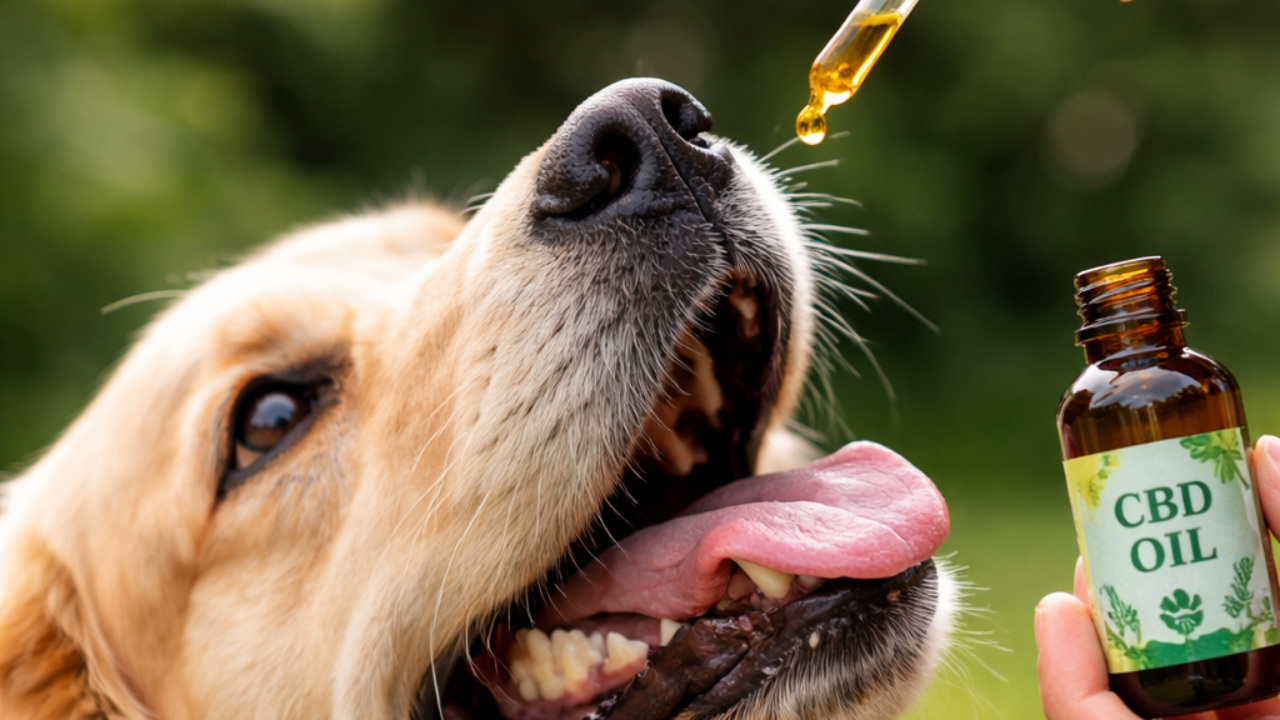How Milk Thistle for Dogs Protects the Liver
Nov 03, 2024
Like us, our dogs have to deal with exposure to toxins on a daily basis. There are toxins in the foods we eat, the water we drink, and the air we breathe. We can't escape them and neither can our pups, unfortunately.
Luckily, we both have an organ that filters out toxins: the liver! The liver works hard to eliminate all the toxic substances we encounter daily. Since it handles so many nasty substances, it's generally more likely than other organs to suffer serious damage.
Common Causes of Liver Damage In Dogs
We can think of many things we see often causing damage. And this list of common causes can help you understand them better:
- Viruses
- Bacteria
- Drugs
- Toxins
- Free radicals
- Inflammation
Dog Breeds Prone to Liver Damage
Liver ailments are surprisingly prevalent in dogs. But it's more common in some breeds than others. Some dog breeds aren't able to get copper out of their bodies properly, which can lead to copper storage disease and liver damage.
This includes:
- Bedlington Terriers
- Dalmatians
- Doberman Pinschers
- Great Danes
- Labrador Retrievers
- West Highland White Terriers
Signs of Liver Damage In Dogs
Watch your dog for the following signs of liver damage:
- Loss of appetite
- Lethargy
- Jaundice (yellowing of the eyes, gums, or skin)
- Dark urine
- Pale gums
- Sudden unexplained weight loss
- Vomiting or diarrhea
- Increased thirst and urination
- Behavioral changes or confusion
Important: If you notice these symptoms, see your vet immediately. Liver disease can progress quickly, and early treatment makes a big difference.
What Is Milk Thistle?
Milk thistle is a flower in the Aster family. It grows naturally in the Mediterranean regions of Europe, North Africa, and the Middle East.
For more than 2000 years, humans have utilized milk thistle for its healing properties, particularly its roots and seeds. Traditional medicine recognizes milk thistle as one of the rare herbs with therapeutic benefits (Tedesco & Guerrini, 2023).
Chemicals in Milk Thistle
There are three important chemicals isolated from the milk thistle plant:
- Silychristine
- Silydianin
- Silybin
Together, these three substances are known as silymarin. Silybin is the most active and powerful component, making up about 50-70% of the silymarin complex.
How Milk Thistle Can Help
We, as humans, usually use milk thistle as a liver tonic. Research suggests silymarin may help dogs with the following:
- Liver or kidney damage
- Hepatitis
- Jaundice
- Leptospirosis
- Recovery from Parvovirus
Milk Thistle As Antioxidant
Milk thistle acts as a potent antioxidant. Antioxidants safeguard us from substances in our bodies known as free radicals. The presence of environmental toxins can escalate the levels of free radicals in our body.
Free radicals can cause serious damage to our dog's cells. This damage is called oxidative stress. It can lead to early aging and long-term diseases like arthritis and cancer.
Milk thistle provides a shield to the liver from detrimental oxidative stress. A study found that milk thistle can reduce toxicity and may also improve the effectiveness of medications in dogs (Porciello et al., 2016).
Milk Thistle Supports Detox
Many over-the-counter and prescription drugs can harm the liver. This is especially true if taken in large amounts or for a long time.
Common medications that stress the liver include:
- Non-steroidal anti-inflammatory drugs (NSAIDs) like carprofen
- Phenobarbital for seizures
- Some antibiotics
- Chemotherapy drugs
Studies have shown that milk thistle can help prevent or lessen the impact of liver damage caused by medications (Pradhan & Girish, 2006). If your dog has been on medication, milk thistle can assist in expelling the harmful chemicals and toxins.
Milk thistle can aid the liver in removing heavy metal toxicity. Therefore, milk thistle can be a beneficial supplement following vaccinations that include mercury (thimerosal) or aluminum (commonly, both).
Milk Thistle For Allergies
The body generates histamine to fight allergens. The liver is instrumental in this process as it eliminates histamine from the body. However, if your dog's liver becomes compromised, it cannot detoxify effectively.
When the liver is overloaded with toxins, histamines can build up in the body. This can lead to more allergic reactions.
The liver is responsible for detoxifying, and when it's unable to perform its function, it stores the toxins. In doing so, it also creates extra histamines for self-protection.
When the body detects an allergen, the brain signals it to release histamines. Sometimes it releases too much, causing an allergic reaction like hives, itching, and sneezing. Cleanse the liver, and you might reduce allergies and related symptoms.
Other Uses For Milk Thistle
A few more things milk thistle can help with include:
Kidney Disease
Silymarin has been shown to reduce drug-induced kidney toxicity that leads to kidney failure in dogs (Pradhan & Girish, 2006).
While milk thistle won't cure kidney disease, it may help protect remaining kidney function when dogs need medications that can damage the kidneys.
Pancreatitis
Pancreatitis is common in dogs. Research suggests milk thistle can help ease the symptoms of pancreatitis and support pancreatic function (Kataki et al., 2014).
Giardia
Researchers have shown that milk thistle may help relieve giardia infections in dogs by supporting overall immune function and gut health.
Diabetes
Some studies suggest that administering milk thistle to dogs at least weekly can reduce the insulin requirement for those afflicted with diabetes (Saller et al., 2008). However, this effect varies between individual dogs.
Important: Monitor your dog's blood sugar levels closely. Talk to your veterinarian before lowering your dog's insulin dosage. Never adjust diabetes medication without professional guidance.
What Milk Thistle Can't Do
Let's be clear about what milk thistle is and isn't:
Milk thistle is NOT:
- A cure for liver disease
- A replacement for veterinary treatment
- Effective for all types of liver problems
- Safe for every dog in every situation
When you need conventional veterinary care instead:
- Acute liver failure (this is an emergency)
- Liver tumors or cancer
- Advanced cirrhosis
- Bile duct obstruction
- Infectious hepatitis (your dog needs antibiotics or antiviral medications)
Think of milk thistle as a supportive therapy—something that helps your dog's liver work better and recover faster, but not something that replaces medical treatment for serious conditions.
How To Use Milk Thistle
Milk thistle isn't a preventative or "just in case" herb. It's best used to cleanse the liver after exposure to toxins or as a remedy for liver damage.
Milk thistle promotes the development of new liver cells to substitute those that are deceased or deteriorating. It also aids in safeguarding against toxins that could inflict additional harm.
When to Consider Using Milk Thistle
- After your dog takes medications known to affect the liver
- During recovery from illness that affected the liver
- After exposure to toxins (like eating something poisonous)
- When your dog has been diagnosed with liver disease
- Following certain vaccinations, if recommended by your vet
Our recommended product is the Milk Thistle from Pet Wellbeing.
[Here's the link to Milk Thistle for Dogs from Pet Wellbeing]
Warning: Milk thistle should not be given to pregnant and nursing dogs. It may affect hormone levels and hasn't been studied enough for safety during pregnancy.
Choosing Quality Milk Thistle Products
Not all milk thistle supplements are created equal. Here's what to look for:
Quality Indicators
Check the label for:
- Standardized extract containing 70-80% silymarin (this is important—lower percentages won't be as effective)
- The amount of silybin (the most active component)
- Third-party testing certification (like NASC or USP verification)
- Clear dosing instructions
- Expiration date
Red flags to avoid:
- Products without standardization information
- Supplements with lots of fillers or additives
- Extremely cheap products (quality extraction is expensive)
- No contact information for the manufacturer
- Claims that sound too good to be true
Forms: Pros and Cons
You can find milk thistle in most health food stores and pet supply retailers, available in capsule, tincture, or powder forms.
Capsules:
- Pros: Easy to dose, convenient, long shelf life, no taste
- Cons: Some dogs won't swallow pills, may be harder to adjust dosing for very small dogs
- Best for: Dogs who take pills easily or can have capsules opened and mixed with food
Tincture (liquid):
- Pros: Easy to adjust dosing, absorbs quickly, good for dogs who won't take pills
- Cons: Usually contains alcohol (though alcohol-free versions exist), shorter shelf life once opened, can taste bitter
- Best for: Tiny dogs needing precise dosing, dogs who refuse pills
Powder:
- Pros: Easy to mix with food, economical for larger dogs, no fillers
- Cons: Can be messy, taste may be noticeable, requires measuring
- Best for: Dogs who eat everything, owners comfortable with measuring supplements
Milk Thistle Dosage For Dogs
The usual recommended extract of milk thistle contains 70 to 80 percent silymarin. Each extract should have a label with the silymarin percentage.
For tincture: Start the dose at around 1/4 tsp per 20 lbs of body weight daily. Ideally, you should divide this amount into 2-4 equal doses throughout the day for best absorption.
For powder or capsules: Provide your dog with 2-5 mg of silymarin per pound of body weight, 2-3 times per day.
NOTE: Check the dosage for your individual product. This can be used as a general guideline. If you are unsure of how much to provide your dog, check with your local veterinarian.
Example dosing:
- 10 lb dog: 20-50 mg of silymarin, 2-3 times daily
- 40 lb dog: 80-200 mg of silymarin, 2-3 times daily
- 70 lb dog: 140-350 mg of silymarin, 2-3 times daily
Start with the lower end of the dosing range and increase gradually if needed.
Getting Your Dog to Take It
Even the best supplement doesn't work if your dog won't take it. Here are some tricks:
For picky eaters:
- Mix powder or opened capsules with a small amount of wet food, peanut butter, or cream cheese
- Give tincture mixed with a bit of low-sodium chicken broth
- Hide capsules in pill pockets or cheese
- Administer right before mealtime when your dog is hungry
Best time to give:
- With food to improve absorption and reduce any stomach upset
- Morning and evening for twice-daily dosing
- Spread throughout the day for maximum benefit
Tip: If your dog experiences any stomach upset (rare but possible), try giving milk thistle with a fuller meal or reducing the dose slightly.
Possible Side Effects and Safety
Milk thistle is generally very safe, but it's not risk-free.
Common Side Effects (rare but possible)
- Mild diarrhea or loose stools
- Gas or stomach upset
- Reduced appetite
- Allergic reaction (itching, hives, swelling)
These effects are uncommon and usually mild. If they occur, stop the supplement and contact your vet.
Drug Interactions
Milk thistle can interact with certain medications because it affects how the liver processes drugs. This could make some medications more or less effective.
Be especially cautious if your dog takes:
- Chemotherapy drugs
- Anti-anxiety medications
- Blood thinners
- Diabetes medications
- Seizure medications
- Immunosuppressants
Always tell your vet about every supplement your dog takes. Bring bottles to appointments so your vet can check ingredients and dosing.
Who Shouldn't Take Milk Thistle
Don't give milk thistle to:
- Pregnant or nursing dogs
- Dogs with known ragweed allergies (milk thistle is in the same family)
- Dogs scheduled for surgery (stop 2 weeks before due to potential effects on blood clotting)
- Dogs with certain types of cancer without veterinary approval (hormone-sensitive cancers)
Check with the Vet
Before giving your dog milk thistle or any herbal supplement, talk to your vet first. This is important, especially if your dog has a health issue. Your vet can help you decide if it's right for your pup.
Questions to ask your vet:
- Is milk thistle appropriate for my dog's specific condition?
- What dosage do you recommend?
- How long should I give it?
- What signs of improvement should I watch for?
- Are there any medications my dog takes that might interact with milk thistle?
- Do you recommend a specific brand?
The Real Talk About Costs
Let's discuss the financial side of milk thistle supplementation:
Typical costs:
- Quality milk thistle supplement: $40-70 per month depending on your dog's size
- Capsules: Usually most economical for small to medium dogs
- Powder: May be best value for large dogs
- Tinctures: Typically most expensive but easiest to dose precisely
Is it worth the investment? If your dog has documented liver issues or takes medications that stress the liver, milk thistle may save you money in the long run by reducing liver damage and potentially decreasing vet bills. However, for healthy dogs with no liver concerns, the money might be better spent on high-quality food and preventive veterinary care.
How to Know If It's Working
Since milk thistle works internally, you can't always see dramatic changes. Here's what to monitor:
Signs milk thistle may be helping:
- Improved appetite and energy levels
- Better digestion
- Reduced allergy symptoms
- Improved bloodwork (liver enzymes trending down)
- Better tolerance of medications
Timeline expectations:
- Some dogs show improvement within 1-2 weeks
- Liver enzyme changes may take 4-6 weeks to show on bloodwork
- Maximum benefits typically seen after 2-3 months of consistent use
When to stop or reassess:
- No improvement after 6-8 weeks of consistent use
- Side effects develop
- Your dog's condition worsens
- Bloodwork shows liver values are normalized
- Your vet recommends discontinuing
Your vet should monitor liver function with bloodwork every 4-8 weeks if your dog has liver disease. This helps track progress and determine if milk thistle is beneficial.
Support Your Dog's Liver Health
Milk thistle can be a valuable tool in supporting your dog's liver health, especially when dealing with known liver stress or damage. Research supports its use as a complementary therapy alongside conventional veterinary treatment (Tedesco & Guerrini, 2023).
However, it's not a miracle cure or a substitute for proper veterinary care. The best approach combines quality nutrition, appropriate medical treatment when needed, and thoughtful use of supplements like milk thistle under veterinary guidance.
Your dog's liver works hard every day to keep them healthy. When it needs extra support, milk thistle, used correctly and with professional guidance, can be part of the solution. Just remember: your vet is your best resource for determining if and when milk thistle is right for your furry friend.
Why is my dog’s liver so important?
Your dog’s liver is the body’s primary detox organ. It filters toxins from food, water, medications, and the environment, helps digest fats, regulates hormones, and supports immunity. Because it works so hard, the liver is especially vulnerable to damage.
What can damage a dog’s liver?
Common causes of liver stress or damage include:
-
Medications (especially long-term use)
-
Environmental toxins
-
Viruses and bacterial infections
-
Inflammation
-
Free radical damage (oxidative stress)
Are some dog breeds more prone to liver disease?
Yes. Certain breeds have genetic challenges with copper metabolism, which can lead to copper storage disease and liver damage. These include:
-
Bedlington Terriers
-
Dalmatians
-
Doberman Pinschers
-
Great Danes
-
Labrador Retrievers
-
West Highland White Terriers
What are the warning signs of liver problems in dogs?
Watch for:
-
Loss of appetite
-
Low energy or lethargy
-
Yellowing of the eyes, gums, or skin (jaundice)
-
Dark urine or pale gums
-
Vomiting or diarrhea
-
Increased thirst and urination
-
Sudden weight loss
-
Behavioral changes or confusion
If you notice these signs, veterinary care is essential.
What is milk thistle, and why is it used for dogs?
Milk thistle is a flowering plant traditionally used to support liver health. Its active compounds help protect liver cells and support the liver’s natural detoxification processes.
What is silymarin, and why does it matter?
Silymarin is the active compound complex in milk thistle. It includes silybin, silychristine, and silydianin. Silybin is the most powerful component and is responsible for most of milk thistle’s liver-supporting effects.
How does milk thistle help the liver?
Milk thistle may:
-
Protect liver cells from toxin damage
-
Reduce oxidative stress
-
Support regeneration of damaged liver cells
-
Improve tolerance to medications that stress the liver
Can milk thistle help dogs on long-term medications?
Yes. Many medications, such as NSAIDs, seizure drugs, antibiotics, and chemotherapy agents, can stress the liver. Milk thistle is often used as supportive care to reduce medication-related liver strain.
References
Kataki, M. S., Murugamani, V., Rajkumari, A., Mehra, P. S., Rao, A., Binda, S., & Singh, L. R. (2014). Silymarin protects against alcohol induced hepatotoxicity in experimental animals. Journal of Clinical and Experimental Hepatology, 4(Suppl 3), S13-S14. https://doi.org/10.1016/j.jceh.2014.02.035
Porciello, F., Marinelli, L., Corsi, L., Avallone, G., Bonsembiante, F., Foiani, G., & Romagnoli, N. (2016). Therapeutic efficacy of silymarin in dogs with chronic hepatopathies. Journal of Veterinary Science & Animal Husbandry, 4(2), 202.
Pradhan, S. C., & Girish, C. (2006). Hepatoprotective herbal drug, silymarin from experimental pharmacology to clinical medicine. Indian Journal of Medical Research, 124(5), 491-504.
Saller, R., Brignoli, R., Melzer, J., & Meier, R. (2008). An updated systematic review with meta-analysis for the clinical evidence of silymarin. Complementary Medicine Research, 15(1), 9-20. https://doi.org/10.1159/000113648
Tedesco, D. E. A., & Guerrini, A. (2023). Use of milk thistle in farm and companion animals: A review. Planta Medica, 89(6), 584-607. https://doi.org/10.1055/a-1969-2440
Become a Dog Cancer Coach.
Transform your passion for dogs into a meaningful, heart-led career with our Holistic Dog Cancer Coach Certification—an in-depth, flexible online program designed for compassionate caregivers ready to make a difference.
Stay connected with news and updates!
Join our mailing list to receive the latest news and updates from our team.
Don't worry, your information will not be shared.
We hate SPAM. We will never sell your information, for any reason.





